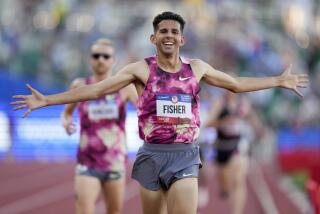On a Role : For Team Player Hegg a Job Well Done --and a 93rd-Place Finish
- Share via
ATLANTA — It might not look like it, but cycling is a team sport.
That’s why Steve Hegg sprinted out to chase down a couple of riders who tried to break away from the pack early in the 138-mile Olympic road race Wednesday.
That’s why Hegg was briefly in the lead during the fifth lap of the 17-lap race--and 93rd when it ended.
Lance Armstrong was the United States’ best medal hope, and in road racing, it’s all for one. Period.
Even though Hegg had won a gold medal in the individual pursuit and contributed to a silver-medal performance in the team pursuit at the 1984 Los Angeles Games at age 20, he was a role player Wednesday. His job was to help keep the race in hand until Armstrong made his move. His job was to lay down a sacrifice.
“I just do whatever they tell me,” said Hegg, 32, who lives in Dana Point, where he trained for the Olympics with U.S. road racer Linda Brenneman.
Even though Hegg is the only gold-medal-winning U.S. cyclist still competing, he was something of an outsider on the U.S. team. The other four riders all race professionally on the Motorola team, led by Armstrong. That means they’re used to covering breakaways for each other, and so used to sharing the workload they know what to expect of each other.
The strategy Wednesday was straightforward, and it worked well enough to put Armstrong in position to take the lead with 24 miles to go. He was chased down, though, and was too exhausted to mount another charge. American Frankie Andreu did what he could, shutting out the pain from his cramping leg muscles to finish fourth.
“Early on, Hegg and Greg Randolph were in charge of keeping things together so me, Lance and George could conserve,” Andreu said. “At halfway, me and George were working for Lance, working to get us to where the race was going to be won.”
U.S. Coach Chris Carmichael said the game plan played out just about right--except the three medalists didn’t cooperate, surprising the Americans with the strength of their sustained breakaway over the final two laps.
“Steve’s job was basically to control the race, to make sure nobody went early, like Italy, France, Spain, Belgium,” Carmichael said. “I’m not disappointed by the outcome.”
Hegg’s 1984 gold-medal performance was somewhat tarnished when he was disqualified from competing in the 1988 Olympics after too much caffeine was discovered in his system at the 1988 trials.
Hegg made the four-man pursuit team, but blood samples showed he had above the allowable limits of caffeine. Hegg pleaded innocent, saying the coffee he drank that morning, combined with the Cokes he consumed during a three-hour rain delay, heightened his caffeine level. He later said he was taking caffeine tablets during the delay, but insisted he did nothing wrong. “If I had to do it all over again, I would do a lot of things differently,” Hegg said. “I would listen more to the right people.”
Before that, in 1985, an investigation by four U.S. Olympic Committee doctors had shown that Hegg was one of several top American athletes who participated in blood doping before their events--a practice that was later banned. He turned pro after the disappointment of being disqualified in 1988, and like many athletes competing in Atlanta, assumed that meant his Olympic career was over.
It wasn’t, with professionals allowed to enter the road race this year for the first time.
Hegg’s ’96 Olympics aren’t over yet, either. And the race he has left has nothing to do with teamwork.
It’s the individual time trial Saturday, known as “the race of truth” because teamwork and drafting are eliminated.
In the time trial, the cyclist rides alone, racing only the clock. Hegg will cover the same eight-mile loop from Wednesday, but only four times.
The racers start at intervals, and the fastest time wins.
Instead of Lycra shorts and a cycling jersey, the riders usually wear one-piece suits, something like a second skin. Helmets and bikes, too, are streamlined, because only hundredths of a second separate the top riders.
Hegg and Armstrong will represent the U.S.
“I’m not in love with the course,” Hegg said of the 32-mile race. “It’s like they said, ‘Here’s something already built. Let’s use it.’ It’s a lot different than what we’re used to as a time trialist.”
It will be a lot different from playing a supporting role too. What Hegg does Saturday will depend only on him.
“I’m not worried about the horsepower,” Hegg said.
Times staff writer Chris Foster contributed to this story.
(BEGIN TEXT OF INFOBOX / INFOGRAPHIC)
Profile
* NAME: Steve Hegg
* AGE: 32
* DISCIPLINE: Cycling
* HOMETOWN: Dana Point
* COMPETITIVE HISTORY: U.S. Olympic team, 1984, 1996. Olympic gold medalist in individual pursuit; silver medalist in team pursuit, 1984. U.S. national team, 1982-94. Thirteen-time senior and pro national champion.
* PERSONAL: Former member of U.S. ski team. Trains with Olympic cyclist Linda Brenneman.
More to Read
Go beyond the scoreboard
Get the latest on L.A.'s teams in the daily Sports Report newsletter.
You may occasionally receive promotional content from the Los Angeles Times.






